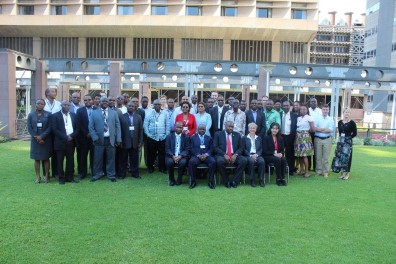GWP's Executive Secretary, Dr. Ania Grobicki spoke during the official opening to congratulated the Country Water Partnerships implementing the WACDEP on their progress in delivering results in the 8 (eight) African countries as well as in four transboundary basins and one transboundary aquifers where the project is under implementation. Her speech emphasized on the importance of the year 2015 - a year in which GWP hopes will be a game-changer in the context of international agreements.
In her speech, Dr. Grobicki reminded participants on the need to reflect on the broader global context in achieving water security by continuing with the established linkages and synergies with key partners in reaching binding international agreements on 3 major fronts in 2015. These are a dedicated water goal within the Sustainable Development Goals (SDGs); negotiation for our climate future through the UNFCCC COP21; and influencing the outcomes of the 3rd World Congress on Disaster Risk Reduction.
Dr. Grobicki further said “Taken all together, 2015 will be a year of great potential for our work. Our water community will be called upon not just to identify the challenges of water management, but to put forward realistic, implementable pathways and models for enabling water security in the context of immense vulnerability and change. Through our WACDEP partnerships and engagements, we stand to be in very good shape to build upon our shared results and achievements to be both prepared for and responsive to the outcomes of these three global processes.”
These sentiments were equally highlighted by the Minister of Environment, Water and Climate Honourable Saviour Kasukuwere when he officiated the workshop. In his opening remarks, Mr. Kasukuwere also called for better water resource management. He further noted that while the Government played a key role in securing water for competing demands, requests for a water secure world was a joint responsibility. This he noted, could only be achieved through water co-operation at national, regional, continental and global level but through partnerships with the multitudes of stakeholders ranging from citizens, policy makers and the private sector.
Ms Laila Oualkacha, the WACDEP focal point person from African Ministers' Council on Water (AMCOW) noted that climate change poses serious threats to sustained economic growth, quality of life and political stability. She further noted that the situation is further aggravated by various multi aspects compounded by low adaptive capacity. It was also noted that although the African Heads of States have shown commitment by adopting a response to climate change through the Sharm el Sheikh declaration in July 2008, more still needs to be done.
The workshop aimed to catalyse the exchange of lessons, share knowledge and technical coordination of the implementation of WACDEP among GWP’s regions and countries. The Technical Coordination Workshops are convened as part of the WACDEP Africa programme.
The format of the 6th WACDEP Technical Coordination Workshop involved the following key meetings over the 5 days, catering for different participants:
1. WACDEP Africa Technical Coordination and Annual Programming Meeting (15. – 17. September): The meeting comes at a time when the project has gone past the halfway mark. The regions and the countries are now implementing a number of the work packages and ensured linkages and synergies of the processes being implemented to support government institutions. This meeting aimed at sharing information and building the capacity of the managers on a number of the technical issues related to the programme implementation. 53 participants coming from East Africa, West Africa, Southern Africa, North Africa, Caribbean, AMCOW Focal Point and GWPO attended.
2. Inception Workshop on Project Preparation (18. – 19. September): A Finance Expert has been recruited and at the national level Consultants have been brought on board to support the implementation of Project Preparation and Financing (WP4). The aim of the meeting was to ensure that the national consultants and project managers are appraised with the work to be carried out under WP 4. 35 participants attended this workshop.
For more information, please download the draft workshop programme.
